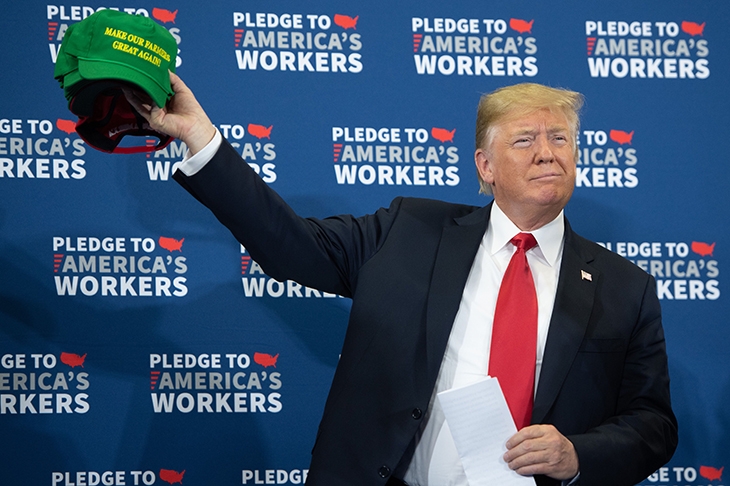Donald Trump campaigned as an unrepentant protectionist and, on the face of it, he has lived up to his word. He has torn up the US-Pacific free- trade partnership, threatened the European Union with trade wars and imposed tariffs on billions of dollars’ worth of imports from China. As you might expect, Beijing’s retaliation has been immediate — as has the damage. American cherry growers, for example, estimate that they have lost about $85 million after suffering retaliatory surcharges. Farmers are now having to be bailed out by the US government. Yet this week Trump has doubled down, introducing tariffs on another 6,000 Chinese imports. When China responds in kind, he says, America will move on to phase three.
Every time that trade wars are attempted, the results are the same. Protectionism might prop up industries which are uncompetitive in global markets, but any benefit is outweighed by costs imposed on, and jobs lost from, other industries. A businessman like Trump ought to know that — perhaps he doesn’t care because China-bashing is popular.
Or might there be method in the madness? A few months ago his former spokesman Anthony Scaramucci told this magazine that, for all the fire and fury, Trump’s objective is quite rational. Years ago, the US decided that goods and services could flow freely in from the developing world, but they accepted higher levels of tariffs on their exports. This was not free trade; it was uneven trade. For a long time, America accepted that imbalance because, as the pre-eminent nation, it could afford to do so. Now, however, China’s economy is the second largest in the world, yet it continues to protect itself through massive tariffs and subsidies. It ought not to enjoy the lopsided trade arrangement agreed when it was poor.
Trump has been perfectly clear what he is up to. Immediately after the G7 summit in June, at which he offended Canadian PM Justin Trudeau by menacing Canada with further tariffs, Trump revealed his goal. ‘No tariffs, no barriers,’ he said. ‘That’s the way it should be. And no subsidies.’ Meanwhile, he pointed out the hypocrisy of Trudeau’s position by drawing attention to Canada’s punitive 270 per cent tariffs on US dairy products — not exactly the behaviour of a country committed to free trade.
Every time the EU tries to present itself as the high-minded champion of free trade, Trump counters with examples of its native protectionism, such as the 10 per cent tariff it charges on cars imported from the US — four times the tariff charged on those travelling in the opposite direction. And when, he asks, will China open its markets to the world in the way US markets are open?
It isn’t just the import and export of goods which makes for free trade. Foreign companies are welcome to bid to run many US public services, including security-sensitive supply and maintenance of military equipment which benefits the UK defence industry enormously. Is it unfair to point out that China would never tolerate foreign companies running its own public services?
The difference between Trump and other G7 leaders is not that they believe in free trade and he does not, but that he has cultivated an acerbic manner of doing business with other world leaders while they prefer a diplomatic approach, shaking on deals behind closed doors and then smiling for the cameras. Trump likes to disrupt, to lob grenades, to reach the point at which he appears to be in open warfare — before turning on the charm and rebuilding relations. It isn’t pretty or edifying, but it may prove effective. It is a tactic which already appears to have made headway with North Korea. While Barack Obama’s restraint achieved nothing, Trump’s exchanges with Kim Jong-un, which involved boasting about the size of his nuclear button, had the dramatic result of bringing Kim to the table and raising the possibility of a nuclear-free Korean peninsula.
Trump’s method is a 21st-century take on Richard Nixon’s ‘mad man’ approach to US relations with China. By being unpredictable, Nixon achieved results. Trump could do the same. It’s worth remembering, too, that when Ronald Reagan came to the White House he had a reputation as a war-mongering hothead. He even made a joke — in front of a radio microphone he thought was switched off — about bombing the Soviet Union. Yet it was his arms build-up, not Jimmy Carter’s sweet reason, which led to the end of the Cold War. By his second term Reagan was proposing the end of all nuclear ballistic missiles.
There is reason to hope Trump may achieve on trade what Reagan did on nuclear disarmament. For that to happen, other leaders must recognise his direction of travel, see through his rhetoric and be prepared to examine their own record on protectionism. Are China’s leaders willing to undertake the seismic shift towards a more open trading system?
Right now, the trade war between the US and the rest of the world will be hurting employees, consumers and investors alike. But if it leads to a world which is much freer of import duties as well as non-tariff barriers, then this year’s skirmishes may be a price worth paying.






Comments